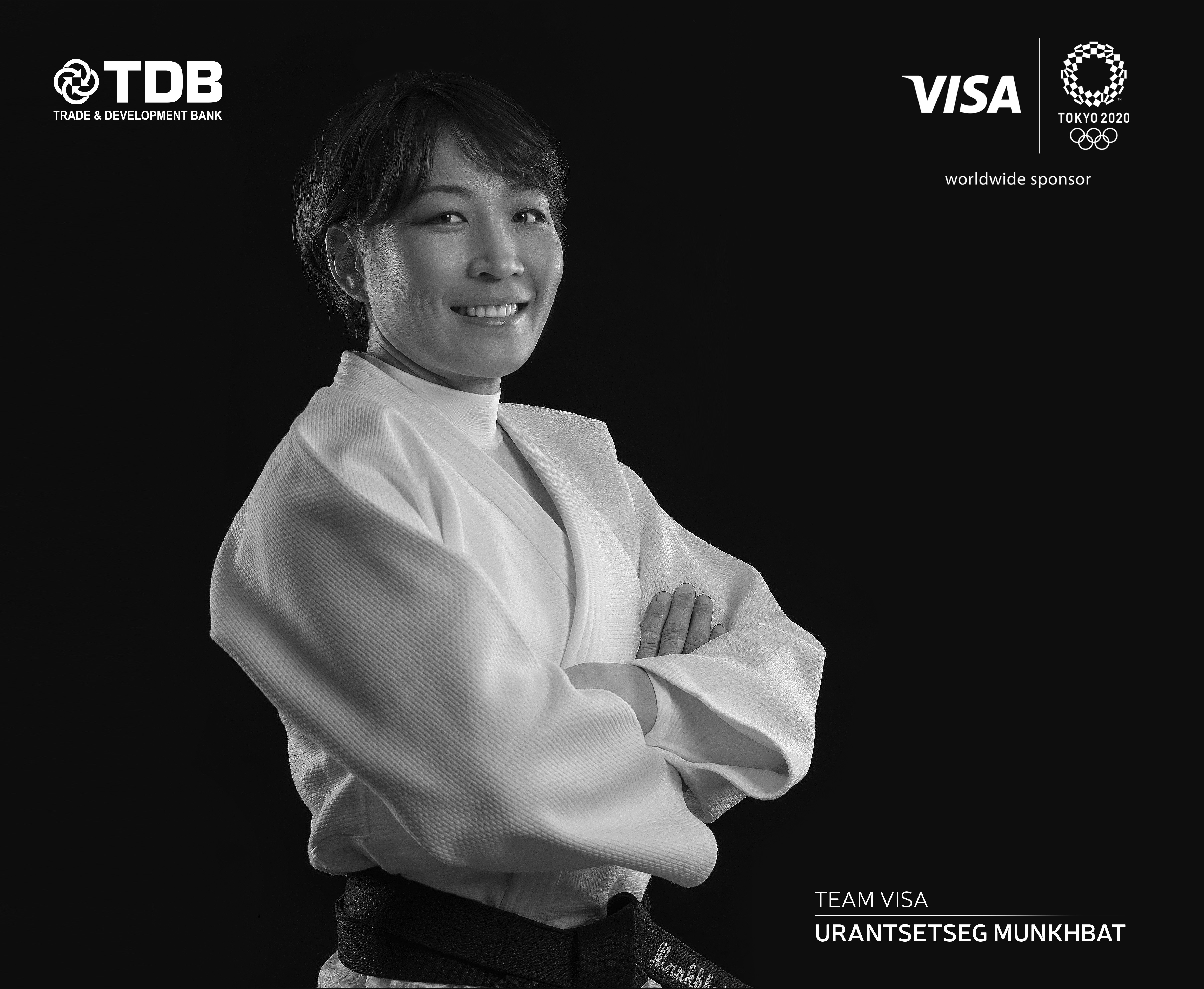
M. Urantsetseg is Mongolia's first female athlete to win gold, silver, and bronze medals at the World Judo Championships. She holds a world record for winning the most medals in IJF World Tour competitions, making her an exceptional athlete and a celebrated figure in Mongolia.
Currently ranked 7th globally, Urantsetseg has secured her place in the 2020 Tokyo Olympics and has become the first Mongolian athlete to join the prestigious “TEAM VISA” program. This global initiative by Visa selects Olympic and Paralympic athletes and legendary sports figures worldwide, recognizing her as a trailblazer in her field.
In an exclusive interview, M. Urantsetseg shares her thoughts:
Journalist: You are the first athlete from Mongolia to join Visa’s TEAM VISA program. How does this benefit your Olympic journey?
M. Urantsetseg:
"Support is incredibly important for any athlete. Being part of TEAM VISA is an honor for me. It’s a highly prestigious program, and only a select few athletes are chosen. I am thrilled to be the first from Mongolia to join, and I hope this will pave the way for more Mongolian athletes to be included in the future.
Joining this program required not only years of consistent effort, training, and achievements but also earning a spot in the Tokyo Olympics. On another note, the reputation of Trade and Development Bank (TDB) and its collaboration with international organizations played a key role in this opportunity.
TDB’s team personally proposed my participation in this program, and I’m deeply grateful for their support. During the agreement process, I realized that Visa evaluates its athletes not just on their sports accomplishments but also on their contributions to society and personal character, which are held to very high standards."
Journalist: Tell us about how you started practicing judo.
M. Urantsetseg:
"My father played a big role in that. I’m a countryside girl, and when I was young, my dad used to encourage me to wrestle with the boys. I loved it and was quite good at it, too.
In our family, we had this shared dream for each sibling. There are four of us—two older brothers, me, and my younger sister. The plan was for my eldest brother to become a businessman, my second brother a singer, me an athlete, and my younger sister a journalist. We would always joke that someday, our journalist sibling would interview the rest of us about our successes. It’s amazing how everything has gone according to plan so far. Now, I just need to win an Olympic medal so my sister can interview me (laughs).
As for judo, I didn’t start with it right away. When I was 16, I actually wanted to try boxing. I went to a boxing gym, but it was closed for renovations. Right next to it was a judo dojo. Every day, I’d check if the boxing gym was open, and I’d peek into the judo dojo. Eventually, I got curious enough to join, and once I started, I loved it. Within a year, I won my first medal."
Journalist: You’ve been a judo athlete for 14 years now. Were there times when you wanted to quit?
M. Urantsetseg:
"Yes, there were. In 2010, I was struggling—I hadn’t won any medals at the World Championships, and I felt like I wasn’t making progress. Around that time, I wanted to compete in the Sambo World Championships, but I didn’t have the money for it. I asked an elder from my hometown for help and confidently told him, 'I’ll come back as a world champion. If I don’t, I’ll repay you.' He supported me, and I returned with a gold medal.
But after that win, I hit another low. I went an entire year without winning any medals, and it really got to me. I thought, 'Why am I wasting resources like this?' I told my coaches I wanted to quit and walked away.
During that break, though, I realized I couldn’t live without training. I lasted just 10 days before I went back. From that moment on, I’ve never considered quitting again. Out of my 14 years in judo, those 10 days were the only time I wasn’t training, and they were the hardest days of my life. It felt like living in hell."
Journalist: "Could you share some memories from competing in the Olympics? And what makes the 2020 Tokyo Olympics particularly special for you?"
M. Urantsetseg:
"My first Olympic experience was at the 2012 London Olympics, and I was still a kid back then. I finished in 7th place. Looking back, I think I performed quite well for my first time. After becoming a World Champion in 2013, I entered the 2016 Rio Olympics with a lot of confidence and pride. I’m sure the public also had high expectations of me.
Unfortunately, right before the Olympics, a new judo rule was introduced prohibiting gripping the opponent’s pants. In a critical match, I lost because I accidentally touched my opponent’s pants—it was a devastating moment for me.
I’ve won three World Championship medals, and some of my most significant achievements are tied to Japan. My first world title came when I defeated a Japanese athlete. More recently, I earned a bronze medal at the World Championships held in Japan. Since judo is Japan’s national sport, competing in the 2020 Tokyo Olympics feels incredibly meaningful. I can confidently say that I’m aiming for a medal at Tokyo."
Journalist: "That’s an inspiring ambition. But making such a commitment can feel daunting, can’t it?"
M. Urantsetseg:
"Of course, it’s not easy to make a promise like that. But there are moments when you truly feel your own potential. If you sense that within yourself, I think it’s right to speak confidently about it."
Journalist: "If you achieve your goal at the Olympics, how much of your life’s purpose would you say has been fulfilled? And how did it feel to find out you hold a world record?"
M. Urantsetseg:
"I’d say about 50%. Reaching my Olympic dream is only halfway to fulfilling my life’s goals.
As for the world record, I didn’t even realize it until I heard about it. I was in complete shock! It’s such a rare opportunity to be recorded in the Guinness World Records. I consider myself very lucky, but I also know luck is the result of hard work. The feeling of achieving such recognition through judo, something I’ve dedicated all my time, energy, and heart to, is absolutely incredible."
Journalist: "When competing, who do you most want by your side?"
M. Urantsetseg:
"Usually, it’s my coaches who are by my side during competitions, and that’s enough for me. My family stays home, praying and supporting me from afar."
Journalist: "When you step onto the mat, what’s on your mind before the match begins?"
M. Urantsetseg:
"I think about my country, my parents, and my homeland. Nothing else comes to mind. Fear, anxiety, and nervousness—they don’t exist for me anymore."
Journalist: "Physical and mental preparation are both critical for athletes. How do you train your mind?"
M. Urantsetseg:
"I used to think I had strong mental resilience. But after working with a sports psychology team, I realized how much more there was to learn. They’ve scientifically validated my mental toughness.
Before having a coach, I believed that managing your mindset was something you had to figure out on your own. Back then, sports psychology wasn’t well-developed in Mongolia. Now, with my psychology team, we don’t just focus on me—they also analyze my opponents. They study their weaknesses, preferred moves, and tendencies, helping me prepare strategies."
Journalist: "So, success isn’t just about your perspective or techniques. It’s also about teamwork, isn’t it?"
M. Urantsetseg:
"Exactly. My own view and skills alone aren’t enough. Success comes from collective effort and insights from other professionals. Teamwork is essential for achieving victory."
Journalist: "In sports, there’s always a balance between experience and youth. How does the younger Urantsetseg who entered her first international competition compare to the Urantsetseg of today?"
M. Urantsetseg:
"I’m completely different now. I wasn’t this composed or calm back then. When I was younger and just starting out, I was impulsive and fiery, almost aggressive. I’d get overly excited and even boastful after winning. But experience teaches you humility.
That unwritten rule has applied to me too. But honestly, a little bit of that fiery spirit is important for an athlete. It’s what motivates you and sharpens your focus. That boldness can be an asset, as long as it’s balanced."
Journalist: "What motivates you outside of judo these days?"
M. Urantsetseg:
"I’m passionate about extreme sports. It’s something I enjoy and a way to make time for myself."
Journalist: "For Mongolians, judo is one of the most beloved Olympic sports. If you had to describe the beauty of judo in a few words, what would you say?"
M. Urantsetseg:
"Unlike other sports, judo is Japan’s national sport, and it reflects Japan’s strict discipline, customs, and traditions. It feels like it’s infused with Eastern ethics and respect. Judo teaches these values exceptionally well. My character and who I am today are undeniably the result of judo."
Journalist: "Every athlete eventually retires. What are your thoughts on this, and what do you hope to achieve after your judo career?"
M. Urantsetseg:
"When that time comes, I plan to dedicate more attention to my family. I’ll continue my work in law enforcement and as a coach. I also have personal plans to venture into business."
Journalist: “The Atmosphere of Olympic Fans and Spectators, and the Advantages of Attending the Tokyo Olympics”
M. Urantsetseg:
Attending the Olympics in person is a dream for many people, an experience that happens perhaps only once in a lifetime. The Tokyo Olympics present a unique opportunity for Mongolians due to several advantages. Firstly, the minimal time difference and proximity to another Asian country make it convenient for travel. Japan is a beautiful country with countless attractions, offering visitors the chance to combine the excitement of the Olympics with memorable sightseeing and exploration. Additionally, compared to traveling to other countries, the costs are likely to be lower, making it a more accessible option for Mongolians.
Imagine the joy of creating unforgettable memories, with Mongolians waving our national flag proudly among the cheering fans, and the echoes of our support reverberating through the stadium. It would truly be a moment of pride and unity for our nation. If you get the chance, don’t miss this incredible opportunity to witness the Olympics and support our athletes while immersing yourself in the vibrant energy of this global event!

